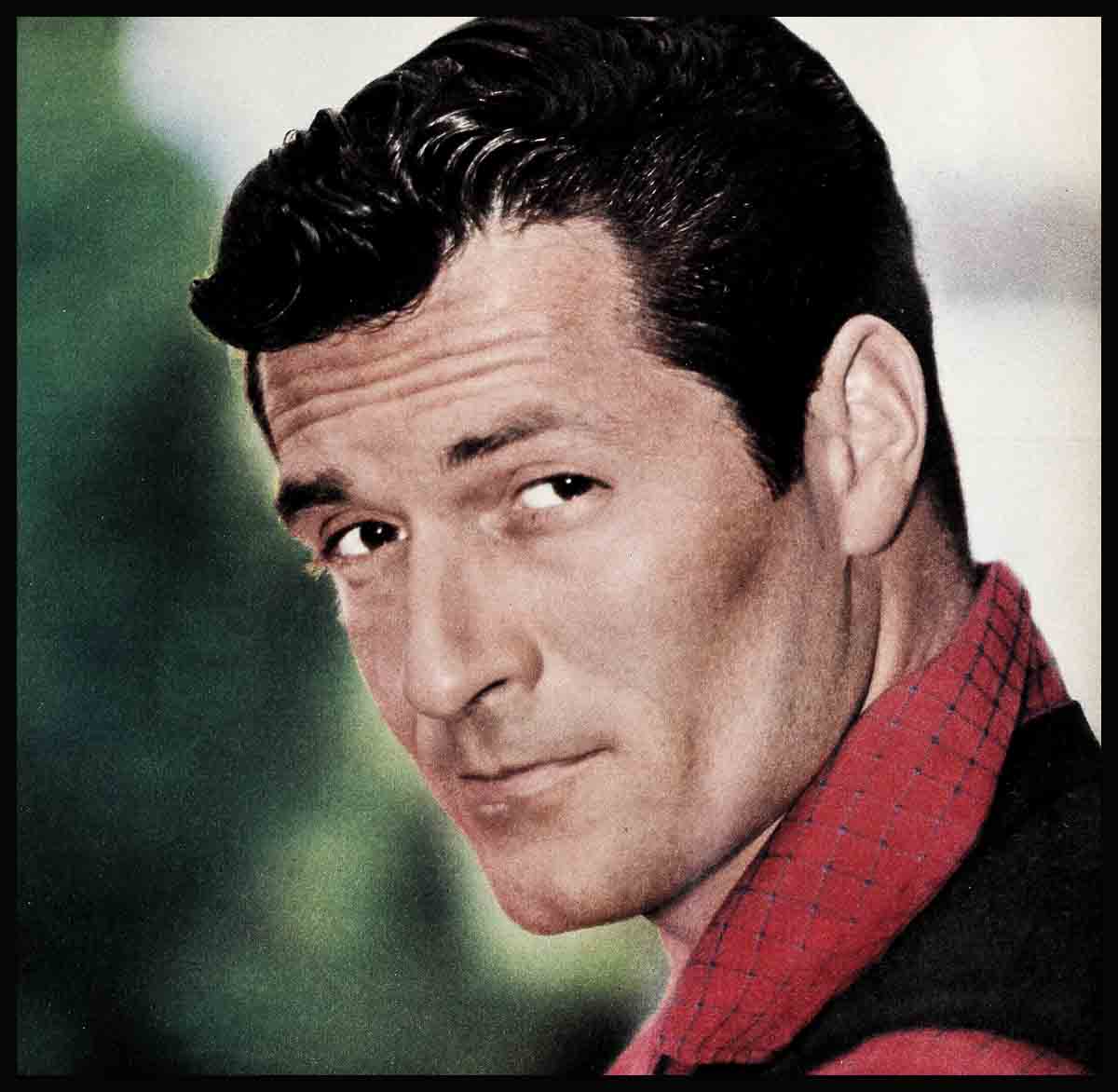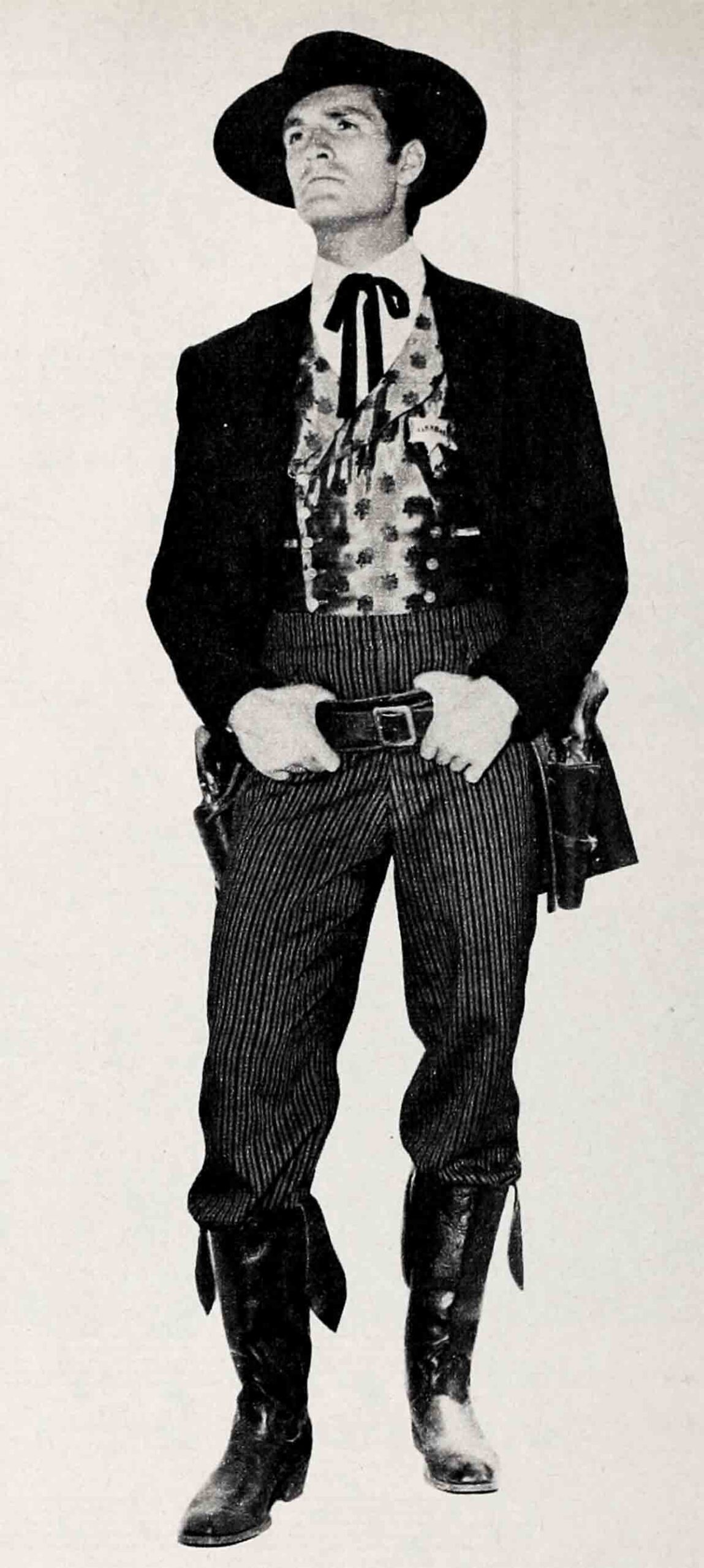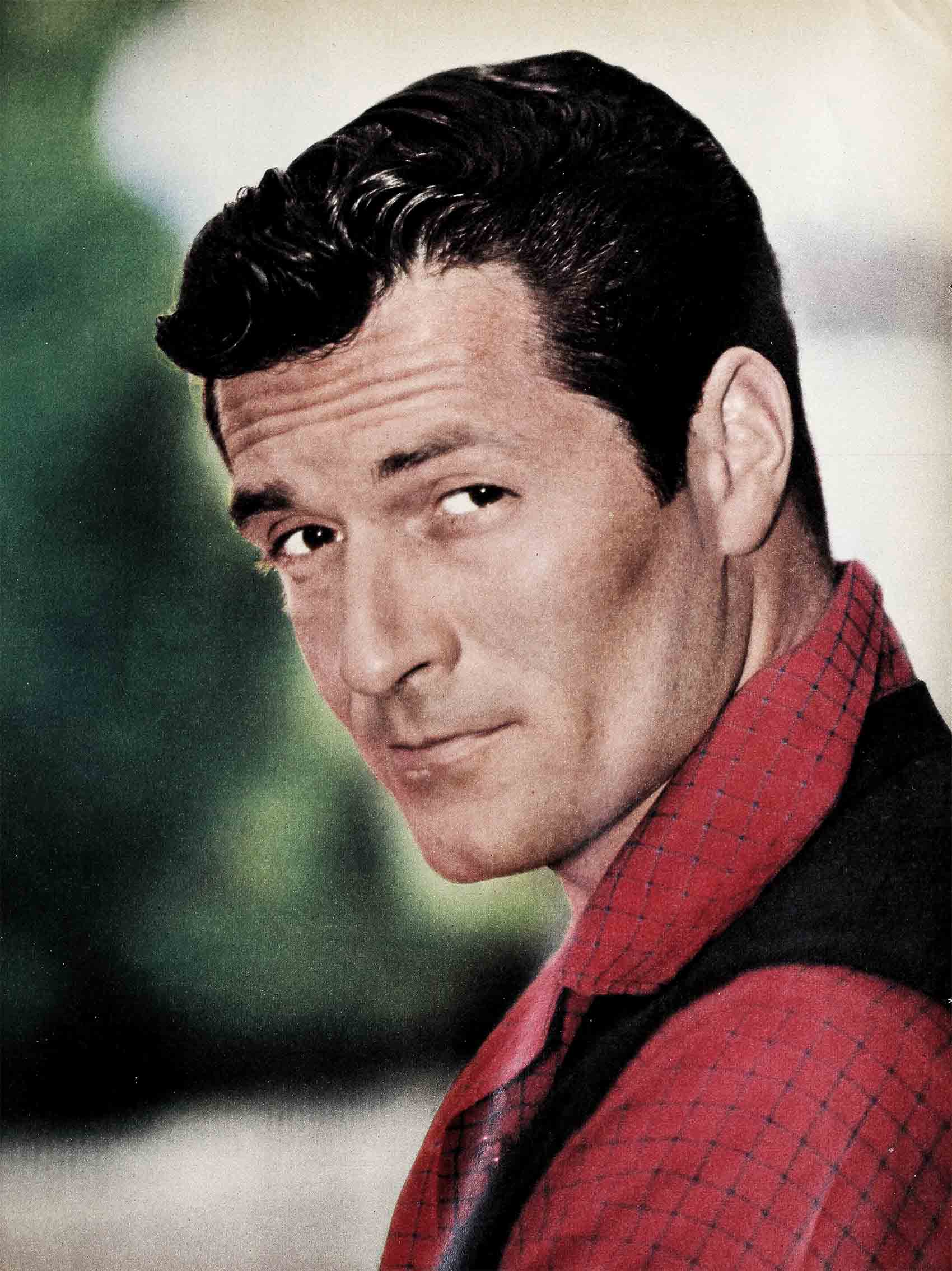
The Return Of Hugh O’Brian
A harried young TV producer brushed by the desk of a chic-looking secretary and asked if he could see her boss, a VP in charge of programming. “Look at this!” He pointed painfully to a news release he had just received from the coast by wire, and read it aloud: “HOLLYWOOD, WHICH HAS BEEN TRYING TO WOO HUGH O’BRIAN BACK FOR SEVERAL SEASONS, MAY NOW HAVE SUCCEEDED, IT IS ANNOUNCED TODAY. . .” The producer’s voice trailed off.
“But what about ‘Wyatt Earp’?” the secretary wailed. Was the network to lose its hottest property to the movies?
Well, Hugh who turned to TV two years ago as star of “The Life and Legend of Wyatt Earp,” hasn’t deserted TV, but the big news around Hollywood these days is that he’s being coaxed back into movies.
A lot of Hugh’s fans don’t realize he was in movies first. He’d appeared in some thirty films before being signed up for television.
“My movie career was no shoo-in,” he says. It has been said that Hugh simply acted in a few little theatres, asked for a role in a picture and got it. Nothing could be farther from the truth, according to Hugh: “I keep thinking about the kids who might read a thing like that and believe it. They’d think, ‘Heck if it’s as easy as that, we can do it, too.’ So some nice kids could end up broke and hungry in Hollywood. I never earned a dime the first three years I was in Hollywood, and, when I got a chance at my first role, I took it without even asking what sort of part it was.”
Nothing much happened to Hugh’s acting career until, receiving a TV bid, he became Wyatt Earp. Then, almost overnight, he was part of an American way of life, teaching millions of youngsters how to draw a gun properly and indoctrinating hundreds of thousands of young mothers on the proper etiquette of handling and raising a wild West hero.
Even movie stars have felt the touch of Hugh’s Wyatt Earp and his fabulous popularity, right in their own homes. Not long ago, Dick Powell played a sheriff in a bad-guy, good-guy saga. His children, Pam and young Richard, watched the film with great interest. Then, over a post-cinema ice cream soda, they launched into a detailed criticism of Dick’s performance as a western sheriff.
“Wait a minute,’ Dick grinned. “What makes you kids such experts?”
With mild scorn, Pam and Richard informed their Dad that they’d seen a real sheriff, so they knew how it was done. The real sheriff? Hugh O’Brian, of course. Shortly thereafter, Hugh received some fan mail from two of Hollywood’s most famous stars, Dick Powell and his wife, June Allyson.
The situation in which Hugh finds himself during his third year as the hero of television’s most popular western program, is practically unique—a popularity that cuts across all boundaries.
“Contrary to the popular notion, my audience is composed largely of adults, many of them women who are particularly susceptible to the Wyatt Earp brand of hero,” says Hugh. Kids are, of course, wildly adoring of him, but only thirty-five percent of his audience is composed of children. They exert a big influence on their folks, however, as is shown by an incident that happened this year at a celebrity-spangled television awards dinner.

Vice-President Richard Nixon, representing President Eisenhower, was handing out the awards, and the tall, lean cowboy star accepted his. As he shook hands with Mr. Nixon and murmured a few grateful words into the microphone, the Vice-President turned to the audience and said, “I’ve just returned from an extensive tour of Europe, where I have met and spoken to many great rulers and statesmen. But nothing that happened to me on that tour is going to impress my kids half as much as the fact that I shook hands with Wyatt Earp.”
This extraordinary nation-wide worship prompts the question: What has Hugh O’Brian got that fascinates women of all ages, and men from the kindergarten to the Vice-Presidency? His success has been one of the most instantaneous in entertainment history. Even Hopalong Cassidy took some years to become a household word.
Examining the elements of the phenomenon known as Hugh O’Brian, one comes up with some fairly unusual qualities. Hugh is extremely tall and slender, whereas most cowboy stars have been rather big and burly. He moves with the grace of a dancer, something Hugh is very proud of; he works hard at dancing (something no cowboy of the past would ever have admitted); and, along with the fact that he plays the personification of Old-West virtue, there is a quality that Hugh projects with his glinting blue eyes and his lean jutting jaw that can only be described as menace.
A dancer’s grace and an air of smoldering danger, are surely strange equipment for a cowboy hero. Yet, as personified by Hugh O’Brian, they have led to an entirely new concept of western heroics. “Strange things happen nowadays in western movies and TV,” says Hugh. “Cowboys kiss girls instead of horses; they speak dialogue that’s a lot more interesting and literate than ‘Yup.’ In fact, they generally seem like real human beings with human weaknesses, and problems, but with that extra heroic gift for the swift draw or the sudden burst of courage that induces hero-worship.” And the general opinion seems to be that Hugh O’Brian and Wyatt Earpled the way.
Not many of his adoring fans are aware of the fact that Hugh’s big break in the movies came from his roles as a villain! When asked about this fantastic switch Hugh grins broadly. “It’s true,” he says. “I was under contract to Universal for three years. And for three long years I was a heavy. Why, during the filming of the first fifteen Wyatt Earp shows, every time there was a gun battle, my instinct was to fall down at the end of the shooting. I had to keep reminding myself that I was the hero and that now I get to live after the shooting’s over.”
One associate of Hugh’s feels part of his secret is that he’s retained some of that sharp edge of menace which came from walking through a thousand swinging doors into a thousand barrooms, gunning for a thousand heroes. Even though he’s no longer a villain, it is that slight bad-guy style applied to the playing of a real good-guy that makes him so attractive to his fans—especially his women fans.
But why didn’t that raw, sharp-eyed attractiveness combine to make him a movie star during his three years at Universal?
“It’s hard to say,” Hugh shrugs good-naturedly. “I got quite a bit of fan mail in spite of the kind of roles I was playing. But for real stardom I think what you need is a prominent sympathetic role in a good picture. One without the other won’t do the trick. A good part in a bad movie or vice versa leads nowhere.”

What about the report that Hugh gets more fan mail than some movie stars with twenty or more years of stardom behind them? “I don’t call it fan mail,” Hugh says to this. “I call it ‘friend’ mail, the same as I call the fan clubs friend clubs. I’d rather have a friend than a fan; that way, it seems to me, there’s less distance between you. I enjoy my relationship with the fans.” He rubbed his chin reflectively. “Unlike some stars who give you the feeling they wouldn’t give their fans the right time of day, I’d rather smile than scowl, any day. I’ll tell you something,” he continued. “There isn’t too much difference between movie and TV fans. Women, for example, have always worshipped movie heroes, and apparently they still use the same emotions in their feelings for stars they see on TV.” (Hugh gets as much mail addressed to Wyatt Earp as to Hugh O’Brian.)
“They’re just as loyal to both kinds of stars. After all, you step up to the boxoffice of a movie house, plunk down money and walk into a big darkened theatre and you kind of expect a fabulous, God-like figure on the screen. But television has a little different flavor. People are allowing you into their homes. You’re a friend—” Hugh laughed wryly, “or an enemy, for that matter. But if they like you, it’s a friend type relationship. And if you’re going to be in their home that often, then you’d just better have a variety of talents.”
“I’m hoping to study an instrument; I’m not sure which one, as yet. And I’m working hard on my dancing and singing. In fact, they’re going to come in handy when I go back to movie acting—which is practically immediately.” Although closely associated with Earp, Hugh
is anxious for a little more variety. “I have seen too many people who have become associated with a certain character sink into oblivion when the public loses interest,” he observes.
“I might be playing the life story of Billy Hill. He was the fellow who wrote ‘Wagon Wheels’ and a lot of great western standards. A musical—that’s just what it will be. A musical biography. In color at that, with bodies hitting the dust.”
And what about the rumors of Hugh getting the girl, for good, in real life?
“All I want from the woman I marry,” he reflects, “is someone who will be a wonderful companion for about sixty years or so. Whether she’s a movie star or not, I’ll tell you this: I’d like her to be understanding of show business. That’s so she’ll be able to appreciate what you’re up against and take things with a grain of salt.
“It’s hard to say about two careers in a family,” he continued. “It’s rough, of course, but I’ve seen some marriages like that which are real happy,” he paused a moment. “. . . Tony Curtis and Janet Leigh, for one. They’re a great couple. Or Debbie and Eddie. Those are some of the good examples. For the bad ones, you don’t need me. You’ve got the divorce records.
“I guess I’m like any other guy,” he said. “If I married a performer, I’d expect her to give up her career to make a home for us. I certainly wouldn’t mind if she worked now and then (talent has to have expression), but it would have to be an avocation. You see, I think marriage should be a woman’s vocation, basically.
“But to be honest with you, I really don’t think, at this point, anyway, that I will ever marry a movie star. There’s a girl in New York I like very much. Her name is Dorothy Bracken. She’s a wonderful girl, a nonprofessional and I think she would make a wonderful wife. You know, my mother and father had a deeply happy marriage until the death of my mother, and when I marry, it will be for keeps.”
Hugh adored his mother, and more than likely the girl he marries will be like her. His mother’s death has been a great tragedy in Hugh’s life. One Christmas, Hugh decided to go home to Rochester for a visit with his folks. He was excited for he had bought a plane ticket, which would bring his mother back to Hollywood with him for the premiere of his first picture, “Young Lovers.” Christmas Eve, with the family all together, was wonderful. But by the following morning, Christmas Day, Hugh’s mother was gone; she had died in her sleep.
As a little boy, Hugh had always been encouraged by his mother in anything creative he’d tried. “My father never wanted me to be an actor—but my mother told me that if this was what I wanted out of life she was with me. She lived just long enough to know I was launched on a career.”
Hugh was silent for a long moment. He stood, unconsciously buckling the gunbelt he would need for the shooting of the next scene.
One of the biggest thrills of Hugh’s career was when stars like Spencer Tracy, Bob Mitchum and Van Heflin began to come up to him at parties, strike up a conversation and ask for an autograph for their son or daughter or nephew, and express their own admiration for him.
“The first time this happened,” says Hugh, “all I could think of was Spencer Tracy in some of the fabulous western roles he’d played. And Bob Mitchum as a cowboy hero in his early pictures. This was high praise from—to use a western phrase—the horse’s mouth.”
While there is no doubt that the time is at hand for Hugh O’Brian to take his rightful place as a movie star, he feels that the enormous exposure week after week on television will not hinder his popularity in movies.
“After all,” commented Hugh, “assuming I’ve made a lot of friends in a lot of homes all over the country, as Wyatt Earp, I figure maybe they’ll want to see me on a giant screen in a theater as well as in their living rooms. After all, if you had a friend who was a movie star, wouldn’t you go to the movies to see him?”
I guess you would—especially if the friend were Hugh O’Brian.
THE END
—BY DANIEL STERN
It is a quote. PHOTOPLAY MAGAZINE DECEMBER 1957





No Comments